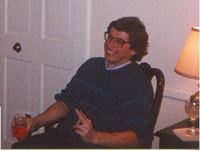 |
 |
 |
 |
![]()
Volume 6,
Issue 4, Summer 2003
| Meet
Your Footnote: Stanley Deetz |

|
Printer-friendly PDF version
Stanley Deetz was my doctoral dissertation advisor.
He made me read Foucault!
However, Stan's role of advisor is the least of all he's done for me. It is obvious to everyone who has met him that Stan Deetz has a brilliant mind. I mean, like Wittgenstein brilliant. I used to stand in awe of this man, both in the classroom and in our personal interactions. I tried to figure out why a scholar and thinker so brilliant as Stan would deem to spend time with a mortal like me. But he did, both as an academic mentor and as a familiar friend to a stranger in a strange land.
I came to the United States from England in 1983, following the path so fearlessly blazed by Dennis Mumby, to study at the phenomenology and semiology capital of America, Southern Illinois University at Carbondale (SIU). Stan was at SIU at that time, and he, along with the likes of Richard Lanigan and Thomas Pace, introduced me to the most bizarre continental philosophy that was to change my world forever. However, no matter how hard I begged, Stan refused to supervise my thesis. He was simply too much in demand from the other students. But he did have the most wonderful volleyball parties most Fridays in the hot Carbondale summer evenings. He also forced me into the classroom, kicking and screaming, as part of my initiation into the hellish world of the graduate assistant. Being the naive Brit that I was, I always assumed that being a "graduate assistant" meant being a "graduate student" who "assisted" some professor. How wrong could I be! The only good part of the whole terrible experience of being thrust in front of a crowd of totally indifferent undergraduate students was that we had to use Stan's new book, "Managing Interpersonal Communication." The graduate assistants spent time each week with Stan, not only learning what to say about his book, but also how to survive those undergraduate students! Stan did his best, but it was still horrible. I have the scars to this day.
I stayed at SIU for one year, after which I returned to England and Stan moved to Rutgers University. I puttered around Sheffield for two years, doing adjunct work in the communication program at Sheffield City Polytechnic. My baptism of fire as a graduate assistant paid dividends after all. It was during that second year that Stan wrote me a letter (this was in the days before email when people actually did write letters!) asking if I would be interested in joining the new Ph. D. program in Communication, Information, and Library Studies at Rutgers University. His description sounded good, and, after all, it was Stan, so I did apply to the program and I returned to the United States in 1986. Once I was at Rutgers, I must admit that I bugged Stan a lot. I figured that since it was Stan who asked *me* to come back to the USA (a rather long trip for me), then maybe he would be interested in my doctoral work. Maybe I could even get him to be my advisor this time. So I hung around Stan like a fly hangs around poop (or should it be like a moth drawn to the flame?) and Stan finally gave in and agreed to supervise my doctoral dissertation. That was the good news! The dark side of this bargain was that Stan was reading Foucault for his own work at that time and so we should struggle through this together. And that, really, is perhaps the only way to approach someone like Foucault because who has the right reading? Stan? Maybe. Me. Certainly not! Our understanding of Foucault grew together as we pieced together that sorry discourse. And it was a great experience.
Stan really cared about ideas. He cared about my ideas. He cared that I should be able to express my ideas clearly, just as Wittgenstein would have wanted. He would never tell me that my ideas were wrong, only that I should express them clearly whatever they were. He was never one to tell me what *his* ideas were, and I was always waiting for that. I would take Stan my lame drafts and expect him to say something like "well, this is what I think about this" or "this is what you need to do to make this right." I never got that. Stan just asked me questions about what I was trying to express and very rarely did he "correct" me or override my thoughts with his own. He would suck this stuff out of me until I felt like screaming! Tell me if this is right! Tell me if this is what you want! Tell me it's crap, for goodness sake! Or tell me that it's good. Stan never told me my work was good. I did hear second hand reports that he may have told other people my work was good (in my fantasies, I guess), but he never really told me. And I always thought my work could never live up to what was hiding in Stan's mind -- the real ideas that Stan would not reveal to me. So I worked as hard as I could to meet up to standards that I thought existed within Stan's mind, but really only existed within my own. And so the dissertation I wrote under Stan's direction was something I never thought I could have produced. Ever. I read it today and I am still amazed. I did that? My goodness! And I still don't know if Stan thinks it is any good.
Back to Top
Home | Current
Issue | Archives | Editorial
Information | Search | Interact